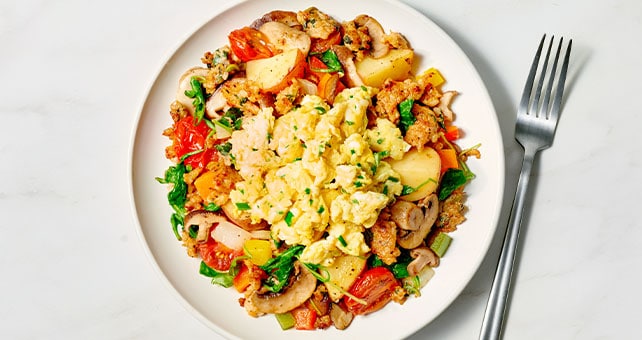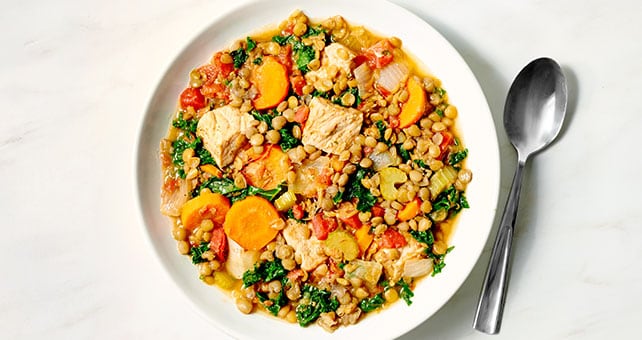Published February 1, 2024
As new research emerges, our understanding of nutrition continues to evolve. February is Heart Health Month, and over the years you may have heard some claims that don't hold up today when considering the most current information. Let’s debunk some common misconceptions about your sweet heart’s health.
Recipes.
Myth 1: All fat is bad.
Our bodies need fats to help produce hormones and absorb vitamins A, D, E, and K.1 Some fats like omega-3s (polyunsaturated fats) are essential and only obtainable through our diets. Omega-3 fatty acids lower triglycerides and are good for eye2 and lung health,3 can improve cognitive health, and aid in the recovery of concussions.4
Monounsaturated fats found in olive oil, nuts, seeds, and avocados have been shown to help maintain a healthy HDL (higher amounts of this cholesterol are cardioprotective) while simultaneously lowering LDL cholesterol (lower amounts of this cholesterol are cardioprotective).5

Myth 2: Saturated fat is good for you.
This can change as new research develops, but some foods like avocados and Brazil nuts contain saturated fats and positively impact cholesterol levels.6 This is because these foods mostly contain mono- and polyunsaturated fats. It is the saturated fat found in butter, lard, ghee, fatty meats, processed meats, and full-fat dairy that is known to raise levels of LDL, the cholesterol shown to negatively impact heart health.
The Dietary Guidelines for Americans, 2020–2025 recommends keeping your total caloric intake of saturated fat under 10%, and the American Heart Association recommends keeping it under 6%.7
And remember: It’s not enough to limit your saturated fat intake. Ensuring a healthy lifestyle with a balanced diet and exercise is important as well.
Try our Better Choice, Heart Smart One Pot Pork, Kale, and Lentil Stew. This lean pork recipe has only 1 gram of saturated fat per serving.
Myth 3: Eggs increase your cholesterol.
Eggs do contain cholesterol. However, although dietary cholesterol was once identified as a contributor to heart disease, studies have not generally supported a link between dietary cholesterol and cardiovascular risk. We know increased LDL cholesterol is associated with increased risk of heart disease,8 and saturated fat influences LDL levels.
In short, we need cholesterol to make and transport hormones through the body. The dietary cholesterol in eggs does not impact our cholesterol levels to the extent we once thought,9 so you can feel good about enjoying our Better Choice, Heart Smart Garden Sausage and Egg Hash recipe.
In fact, healthy people can include up to a whole egg (or the equivalent) in their daily diets. Older people with healthy cholesterol levels can include two.10
Myth 4: Red yeast rice is safer than statins.
Red yeast rice and statins both contain monacolin K, which lowers blood cholesterol. However, consuming red yeast rice carries similar risks as consuming statins, including muscle, kidney, and liver damage and drug interactions with other medications and supplements.9
Since it is a supplement, red yeast rice is not regulated the same way pharmaceutical drugs are. As such, red yeast rice is prone to contamination and inaccurate labeling. Having a higher or lower dose than necessary of monacolin K can be harmful. Because of this, the FDA does not approve the sale of red yeast rice with more than trace amounts of monacolin K.11
Myth 5: Wine is protective for my heart.
No current studies show that drinking alcohol can favorably impact your heart. It is, at best, unclear if red wine is directly associated with heart health benefits.12
We do know that alcohol can adversely affect our overall health. However, it’s also true that resveratrol—an antioxidant found in red wine—is beneficial for heart health.13 Adding red wine to your diet to help your heart might be false pretense due to the alcohol. However, adding foods with resveratrol to help your heart should be the focus.
One thing’s for sure: While there is no silver bullet, there are plenty of good options for keeping your heart healthy. Experts agree that a person’s overall diet influences their risk of heart disease more than any single nutrient, and it’s important to consider these factors.
Now you can add flexibility to your diet knowing that not all fats are bad, some fats help protect the heart, eggs are not the enemy, red yeast rice has some notable precautions, and although wine itself may not be a heart hero, the components of wine may be. Always speak to your doctor or dietitian to learn ways to keep your sweet heart well.
For the love of you.
Choosing how you eat is uniquely personal. It’s about your needs, your preferences, and your goals. As your wellness ally, we’re in your corner with fresh ideas, recipes, and wellness icons that make it easier to shift toward wiser food choices. It’s all about you, at your very best.
Sources.
1Dietary Fats. American Heart Association. November 1, 2021.
2Omega-3 Fatty Acids. National Institutes of Health. July 18, 2022.
3Omega-3 fatty acids appear promising for maintaining lung health. National Institutes of Health. July 20, 2023.
4Anjali Gupta, Greg Summerville, and Carlin Senter. Treatment of Acute Sports-Related Concussion. National Library of Medicine. March 18, 2019.
5Soliman, Ghada A. Dietary Cholesterol and the Lack of Evidence in Cardiovascular Disease. National Library of Medicine. June 16, 2018.
6Colpo, Elisângela, Carlos Dalton de Avila Vilanova, and Luiz Gustavo Brenner Reetz, et al. A Single Consumption of High Amounts of the Brazil Nuts Improves Lipid Profile of Healthy Volunteers. National Library of Medicine. June 11, 2013.
7Saturated Fat. American Heart Association. November 1, 2021.
8Harvard Medical School. Ask the Doctor: Are Eggs Risky for Heart Health? Harvard Health Publishing. December 14, 2021.
9Eggs and Cholesterol. Heart Foundation. Accessed October 6, 2023.
10Merschel, Michael. Here's the Latest on Dietary Cholesterol and How It Fits in with a Healthy Diet. American Heart Association. August 25, 2023.
11Red Yeast Rice: What You Need to Know. National Center for Complementary and Integrative Health. November 2022.
12Drinking Red Wine for Heart Health? American Heart Association. May 24, 2019.
13Castaldo, Luigi, Alfonso Narváez, and Luana Izzo, et al. Red Wine Consumption and Cardiovascular Health. National Library of Medicine. October 8, 2019.

 You are about to leave publix.com and enter the Instacart site that they operate and control. Publix’s delivery and curbside pickup item prices are higher than item prices in physical store locations. Prices are based on data collected in store and are subject to delays and errors. Fees, tips & taxes may apply. Subject to terms & availability. Publix Liquors orders cannot be combined with grocery delivery. Drink Responsibly. Be 21. For prescription delivery, log in to your pharmacy account by using the Publix Pharmacy app or visiting
You are about to leave publix.com and enter the Instacart site that they operate and control. Publix’s delivery and curbside pickup item prices are higher than item prices in physical store locations. Prices are based on data collected in store and are subject to delays and errors. Fees, tips & taxes may apply. Subject to terms & availability. Publix Liquors orders cannot be combined with grocery delivery. Drink Responsibly. Be 21. For prescription delivery, log in to your pharmacy account by using the Publix Pharmacy app or visiting 
